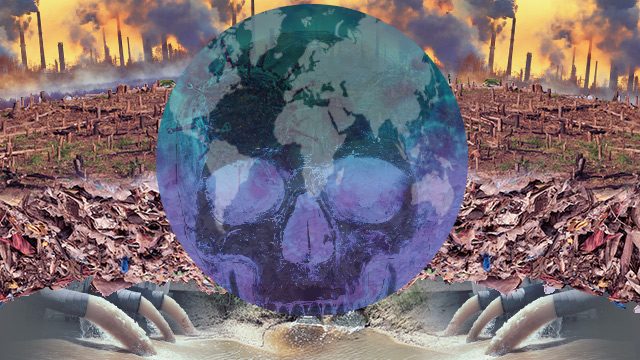SUMMARY
This is AI generated summarization, which may have errors. For context, always refer to the full article.

NAIROBI, Kenya (UPDATED) – A quarter of all premature deaths and diseases worldwide are due to man-made pollution and environmental damage, the United Nations said Wednesday, March 13, in a landmark report on the planet’s parlous state.
Deadly smog-inducing emissions, chemicals polluting drinking water, and the accelerating destruction of ecosystems crucial to the livelihoods of billions of people are driving a worldwide epidemic that hampers the global economy, it warned.
The Global Environment Outlook (GEO) – a report 6 years in the making compiled by 250 scientists from 70 nations – depicts a growing chasm between rich and poor countries as rampant overconsumption, pollution, and food waste in the developed world leads to hunger, poverty, and disease elsewhere.
As greenhouse gas emissions continue to rise amid a preponderance of droughts, floods and superstorms made worse by climbing sea levels, there is a growing political consensus that climate change poses a future risk to billions.
But the health impacts of pollution, deforestation and the mechanized food-chain are less well understood.
Nor is there any international agreement for the environment close to covering what the 2015 Paris accord does for climate.
The GEO compiles a litany of pollution-related health emergencies.
It said that poor environmental conditions “cause approximately 25% of global disease and mortality” – around 9 million deaths in 2015 alone.
Lacking access to clean drinking supplies, 1.4 million people die each year from preventable diseases such as diarrhea and parasites linked to pathogen-riddled water and poor sanitation.
Chemicals pumped into the seas cause “potentially multi-generational” adverse health effects, and land degradation through mega-farming and deforestation occurs in areas of Earth home to 3.2 billion people.
The report says air pollution causes 6-7 million early deaths annually.
“Urgent action at an unprecedented scale is necessary to arrest and reverse this situation,” said a note to policymakers accompanying the report.
‘Massive human damage’
“If you have a healthy planet it supports not only global GDP but it also supports the lives of the very poorest because they depend on clean air and clean water,” Joyeeta Gupta, GEO co-chair, told Agence France-Presse (AFP).
“If you turn that around, an unhealthy system has massive damage on human lives.”
The report called for a root-and-branch detoxifying of human behavior while insisting that the situation is not unassailable.
Food waste for instance, which accounts for 9% of global greenhouse gas emissions, could be slashed. The world currently throws away a third of all food produced. That figure is fuelled by 56% in richer nations going to waste.
“Everyone is saying that by 2050 we have to feed 10 billion people, but that doesn’t mean we have to double production,” Gupta said.
“If we reduce our waste and perhaps have less meat you could immediately reduce that problem.”
The report also called for a rapid drawdown in greenhouse gas emissions and pesticide use to improve air and water quality, and a move towards more sustainable industry.
“There is a clear prognosis of what will happen if we continue with business as usual,” UN Secretary-General Antonio Guterres said.
Tale of inequality
The GEO draws on hundreds of data sources to calculate the environmental impact on over 100 diseases.
Its unveiling at the UN Environment Assembly in Nairobi is likely to add to the debate over who bears the greatest responsibility for the damage already borne by Earth.
Sources close to the negotiations told AFP some developed nations, led by the United States, had threatened not to “welcome” the GEO report – a procedural but nonetheless significant hurdle if nations are to agree on the necessary cuts in waste, overconsumption and pollution.
Gupta said that nations, however big or small, would all have to adapt to the environmental reality facing every human on the planet.
“If you look at land, it’s fixed,” she said. “If the population is going to go up we have to redistribute, one way or the other.
“If you look at freshwater, it’s more or less fixed. You have to end up sharing. This is a discourse that many developed countries don’t like.”
Mohamed Adow, climate lead for Christian Aid, said while the report highlighted many dangers and solutions, it stopped short of directly naming the problem.
“Our environmental and climatic breakdown is driven by an economic model that pursues endless growth at all costs,” he told AFP.
“Without reform and transformational change it’s not sustainable and the UN needs to spell out these hard inconvenient truths.” – Rappler.com
Add a comment
How does this make you feel?
There are no comments yet. Add your comment to start the conversation.